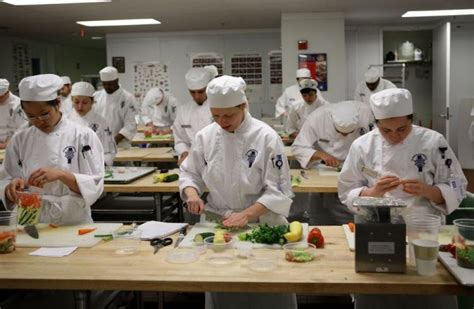The Culinary Institute of America (CIA) stands as a renowned institution, nurturing aspiring chefs and culinary professionals to achieve their culinary aspirations. With campuses in New York, California, and Texas, the CIA offers an array of classes that cater to diverse culinary interests and skill levels.

Comprehensive Curriculum
The CIA’s comprehensive curriculum empowers students with a solid foundation in culinary arts. Courses cover a wide spectrum of topics, including:
- Culinary Fundamentals: Covers knife skills, cooking techniques, and basic principles of food preparation.
- Food Science: Explores the scientific principles underlying food preparation, safety, and sanitation.
- Pastry Arts: Specializes in the art of creating pastries, breads, and confections.
- Restaurant Management: Provides knowledge and skills for managing culinary operations, including menu planning, costing, and staff supervision.
- Culinary Innovation: Fosters creativity and experimentation, encouraging students to push culinary boundaries.
Flexible Learning Options
Recognizing the diverse needs of students, the CIA offers various learning options:
- Full-Time Programs: Immersive coursework for culinary enthusiasts seeking a comprehensive education in a structured environment.
- Part-Time Programs: Allow students to balance their education with work or other commitments.
- Online Programs: Provide flexibility for those seeking convenience and accessibility.
- Continuing Education Courses: Offer specialized training and skill enhancement for professionals in the culinary field.
Benefits of Attending the CIA
Enrolling in CIA classes offers numerous benefits:
- Renowned Faculty: Learn from world-class chefs and culinary experts who share their expertise and passion.
- State-of-the-Art Facilities: Access modern kitchens, bakeries, and dining facilities equipped with the latest technology.
- Professional Partnerships: Gain valuable industry connections through partnerships with leading restaurants and culinary organizations.
- Career Services: Receive personalized guidance and assistance in finding internships, apprenticeships, and job placements.
- Alumni Network: Join a vast network of successful culinary professionals who provide mentorship and support.
Choosing the Right Class
Selecting the appropriate CIA class depends on your culinary goals and experience level. Consider the following factors:
- Program Length: Full-time programs range from 2 to 4 years, while part-time programs can take longer.
- Curriculum Focus: Choose a program that aligns with your specific interests, whether it’s culinary fundamentals, pastry arts, or restaurant management.
- Learning Format: Determine if a full-time, part-time, or online format suits your schedule and learning preferences.
- Cost: Factor in tuition, fees, and living expenses when making your decision.
Common Mistakes to Avoid
To ensure a successful learning experience at the CIA, avoid common pitfalls:
- Underestimating the Workload: CIA classes are demanding and require a significant commitment of time and effort. Be prepared for long hours of study and practical work.
- Choosing the Wrong Program: Carefully consider your interests and career aspirations before enrolling in a program. Avoid selecting a program simply based on its reputation or duration.
- Lack of Hands-On Experience: Prioritize programs that provide ample opportunities for hands-on training in professional kitchens. This practical experience is crucial for culinary development.
- Poor Time Management: Set realistic study schedules and stick to them to avoid falling behind. Utilize the CIA’s resources, such as academic advising and tutoring.
- Not Engaging with Feedback: Seek regular feedback from your instructors and peers to identify areas for improvement. Constructive criticism is essential for growth.
Why the CIA Matters
The CIA serves as a pivotal institution in the culinary industry for several reasons:
- Culinary Excellence: The CIA has consistently ranked among the top culinary schools worldwide, renowned for its exceptional training and high standards.
- Alumni Success: CIA graduates have achieved remarkable accomplishments in various sectors of the culinary world, from renowned chefs to successful restaurant owners.
- Industry Impact: The CIA actively engages with the culinary industry through research, innovation, and advocacy, contributing to the advancement of the field.
- Community Building: The CIA fosters a vibrant culinary community that connects students, alumni, and industry professionals.
- Commitment to Diversity: The CIA values diversity and inclusivity, welcoming students from all backgrounds and creating an equitable learning environment.
Culinary Innovations from CIA Classes
The CIA’s commitment to innovation inspires students to push culinary boundaries, resulting in groundbreaking ideas and applications:
- Molecular Gastronomy: Explores the intersection of science and cooking, enabling chefs to create dishes with unique textures, flavors, and presentations.
- Sous Vide Cooking: Utilizes a precise temperature-controlled water bath to cook food evenly and maintain its tenderness and juiciness.
- 3D Printing in Food: Uses 3D printers to create intricate and customized food items, opening up new possibilities for presentation and creativity.
- Culinary Fermentation: Focuses on the controlled fermentation of foods to develop complex flavors and enhance their nutritional value.
- Plant-Based Cuisine: Celebrates the use of plant-based ingredients, providing sustainable and nutritious alternatives to traditional dishes.
Tables for Easy Reference
Table 1: CIA Full-Time Programs
| Program | Duration | Tuition and Fees |
|---|---|---|
| Associate in Occupational Studies (AOS) in Culinary Arts | 20 months | $35,540 |
| Bachelor’s in Professional Studies (BPS) in Culinary Arts Management | 42 months | $79,350 |
| Bachelor’s in Science (BS) in Culinary Science | 42 months | $82,950 |
Table 2: CIA Part-Time Programs
| Program | Duration | Tuition and Fees |
|---|---|---|
| AOS in Culinary Arts | 30 months | $42,990 |
| BPS in Culinary Arts Management | 60 months | $95,220 |
| BS in Culinary Science | 60 months | $99,600 |
Table 3: CIA Online Programs
| Program | Duration | Tuition and Fees |
|---|---|---|
| Culinary Fundamentals Certificate | 12 months | $20,590 |
| Baking and Pastry Arts Certificate | 10 months | $18,200 |
| Food and Beverage Management Certificate | 10 months | $18,200 |
Table 4: CIAContinuing Education Courses
| Course | Duration | Tuition and Fees |
|---|---|---|
| Knife Skills for Professional Chefs | 3 days | $1,295 |
| Advanced Techniques in Chocolate Making | 5 days | $2,495 |
| Restaurant Management for Emerging Leaders | 3 days | $1,995 |
